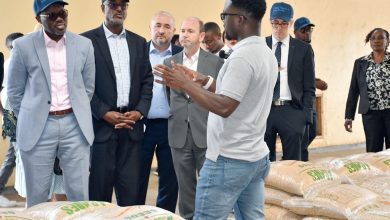Skills for marginalised girls
What do you do when you cannot afford further schooling and all dreams seem to crush?
Angela Makono, 26, asks with finality when asked about life after her stuttering secondary education—a lost six years she moved from dreaming big to low self-esteem, bearing two children in the process.
“Day and night, I pitied myself because I didn’t get good grades to go to university. My widowed mother couldn’t afford to put me in a private college and nothing seemed to work for me,” she recounts.
Makono lazed around her home near Migowi Trading Centre in Phalombe District.
She narrates: “My father died before my birth. My mother sacrificed a lot to keep me in school, but I had nothing to show for it. No job. No skill.
“I felt sad, remembering the times teachers at Migowi Community Day Secondary School sent me back because she had not paid school fees. The moments I missed classes for weeks waiting for her to raise some money.”

Makono pities herself no more. In January, she made her first trip to Blantyre City—not to scramble for scarce jobs with peers fleeing rural areas, but to learn tailoring and fashion design at Soche Technical College.
The mother of two is learning her chosen trade stitch by stitch with support from the MasterCard Foundation through the Forum for African Women Educationalists in Malawi (Fawema).
“I always wanted to do this job, so it’s a dream come true. I was thrilled to take the minibus to the college that has become home for the past 10 months. I was overjoyed. It was a stitch in time,” she says.
Makono is among 191 disadvantaged students in seven national technical colleges supported by the $22 million Second Chances Pathway to increase access to higher learning for marginalised young women and men.
The bursary covers transport costs, tuition, a stipend, boarding fees, beddings, protective wear and medical care.
“It’s a huge boost for my training. Many girls in my area marry and become mothers too young because of poverty and lack of such chances,” she states.
Fawema executive director Wesley Chabwera says the seven-year initiative targets vulnerable young people from hard-to-reach settings to where most schools lack requisite facilities for effective teaching of science, technology, engineering and mathematics.
“The project targets 750 learners in public universities and 600 in technical colleges by 2030. We are talking about 1 350 young Malawians who are disadvantaged physically and geographically,” he said.
Last week, Fawema distributed 96 laptop computers and 191 sets of work suits, boots and beddings to the first cohort, including Makono.
Fawema board chairperson Maggie Mandimbo: “This Second Chances Pathway project is about equality, equity, and empowerment. We are celebrating progress by reaffirming our commitment to inclusive education.”
Access to relevant skills for all is pivotal to the national vision to transform Malawi into an inclusive, self-reliant, industrialised, upper middle-income economy by 2030.
“Together, we can build an inclusive and equitable future in line with the Malawi2063,” says Mandimbo.
Ministry of Labour principal quality assurance officer Annette Chiweza challenged the recipients to put the tools to good use for a safe learning environment as they acquire skills the country needs to develop.
Electrical installation and electronics trainee Doreen Jasi, from Chang’ambika floodplain in Chikwawa District, sighed with relief after receiving the bailout package.
“I left home with three dresses, four blouses, three skirts and no protective wear, but I was determined to sweat for my dreams because mom, who has raised me singlehandedly since 2022, worked extremely hard to keep my dreams alive,” she says.
The 20-year-old spent two years idling at home, growing pigeon peas often damaged by floods and drought typical of the Shire Valley locality, almost 70km west of Chikwawa Boma.
“For two terms, I’ve been learning my trade without any protective wear and a computer. Now I have what I couldn’t afford. I’ll work harder to uplift myself and make my mother and those who support me proud,” she says.
Likewise, Thokozani Mbewe, 22, from Khombedza in Salima, could not hide her joy while unpacking the bailout package, starting with her computer.
She states: “I thank Fawema and its partners for these priceless gifts so that we can excel in our training and improve our lives and communities.
“There is no better way to show gratitude than to work hard. I want to become a successful fashion designer with a clothing line that can inspire girls in my community to dream big and never give up.”





